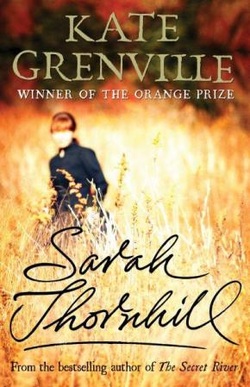SARAH THORNHILL - Kate Grenville

In my opinion, the better story would have been that of the adopted Maori granddaughter who was brought to the Thornhill household. Yet, Rachel is never anything more than a token character in the book and I got the sense that Grenville took the easy way out by focussing on the life of Sarah, instead.
The book starts well enough and Grenville’s skill as a writer shines through. I quickly became enthralled by the continuing struggle of the early settlers to carve out their lives in the harsh but stunningly beautiful, Australian outback.
Sarah starts as a strong and fascinating character (albeit illiterate) with a distinctive voice of her own:
‘They called us the Colony of New South Wales. I never liked that. We wasn’t new anything. We was ourselves.’
In her mid-teens, Sarah falls passionately in love with a Jack Langland, the mixed race son of a neighbour. She enjoys a wonderful sexual relationship with him under the nose of her family, who seem to have an ambivalent (and not wholly convincing) attitude to the blacks. They welcome Jack into their house and adopt the mixed race daughter of their dead son, but refuse to sanction the inter-racial marriage of the young lovers, who are torn apart.
Sadly, this is where the book began to go downhill for me. Sarah and Jack are not Cathy and Heathcliff, or Romeo and Juliet; I felt they gave up the fight for each other very quickly.
It then became apparent that this novel sacrifices realistic character development in order to concentrate on the wider issue of the brutality and cruelty of the white settlers towards the indigenous black populations of New Zealand and Australia. Yes, this is a story which needs telling. Grenville cleverly accomplished this in her previous book, The Secret River, which shows the cruelty but wonderful fallible humanity of a memorable cast of characters at the same time - but she doesn't manage this in Sarah Thornhill.
Unfortunately, this novel degenerates into a book dominated by Sarah’s need to atone for the sins of her father. This is not a theme I am ever comfortable with. Realistic character development and plot were sacrificed for this wider political message to the Australian public. The ending was particularly disappointing and very frustrating.
 RSS Feed
RSS Feed